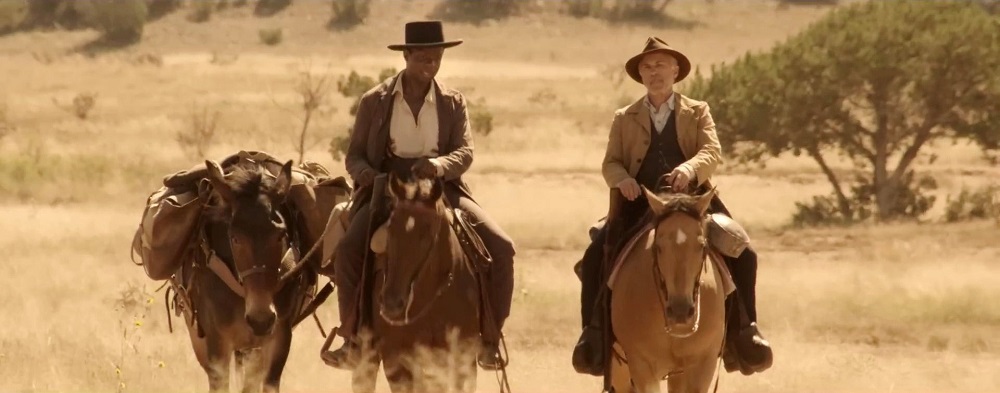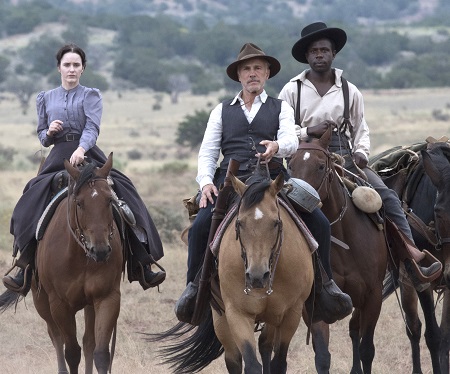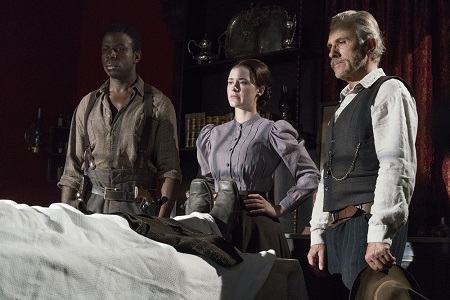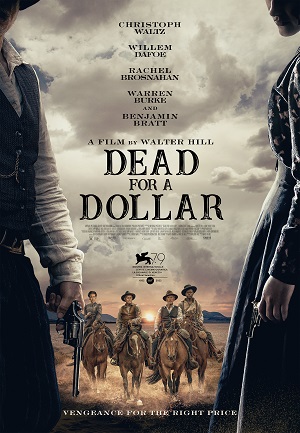
Walter Hill’s Dead for a Dollar a Quick-Draw Jolt of Western Pulp Fiction
There is nothing flashy about Walter Hill’s latest western Dead for a Dollar. The film is dedicated to Budd Boetticher for a reason. Much like that legendary filmmaker’s classics made with star Randolph Scott – most notably Buchanan Rides Alone, Ride Lonesome, Decision at Sundown – this is an angry drama about hard men making tough choices all the while looking down the barrel of a gun they know someday will hit its target.
Those expecting something akin to past Hill classics like The Long Riders, Southern Comfort, or Extreme Prejudice will likely be somewhat disappointed. For all the gunfire and bloodshed, this story is more about verbal confrontations and moralistic dilemmas than it is about wild displays of action or sequences of bloody violence. Hill spends time getting to know the inner workings of his character, letting the audience get a feel for who they are through brief nuggets of dialogue that say precious little but frequently reveal a whole heck of a lot.
I’ve always kind of loved it when Hill gets introspective. From his early days helming down-and-dirty barnburners like Hard Times and The Driver, to his frequently overlooked 1990s run of Trespass, Geronimo: An American Legend, and the criminally underrated Wild Bill with Jeff Bridges and Ellen Barkin, his solid genre craftsmanship and insistence on digging into the thornier recesses of the human condition has always excited me. Hill refuses to paint in black and white, his heroes often as ugly as his villains, and I think this is why almost all of the motion pictures he’s helmed – even misfires like Brewster’s Millions, Supernova, and The Assignment – are fascinating watches precisely because of their ambitious flaws and not in spite of them.
Dead for a Dollar follows renowned bounty hunter Max Borlund (Christoph Waltz). With the blessing of the United States calvary, he has been hired by wealthy Santa Fe businessman Mr. Kidd (Hamish Linklater) to rescue his kidnapped wife Rachel (Rachel Brosnahan) from Buffalo Soldier Elijah Jones (Brandon Scott). They are currently holed up in Mexico waiting for a $10,000 ransom, Jones’ expecting his best friend and fellow soldier Sergeant Alonzo Poe (Warren Burke) to be bringing it to them.
What Borlund was not told was that Rachel was not kidnapped. Instead, she was fleeing an abusive marriage, Jones assisting her to get away from her vindictive husband, the two of them planning on fleeing to Cuba once they get their hands on the ransom. But Borlund has a job to do no matter how distasteful it may be, and with Poe’s assistance he is determined to see things through to the end, even if the outcome may not be the one the manipulative Mr. Kidd was hoping for.
Into this mix is also thrown recently paroled horse thief, cardsharp, and notorious quickdraw artist Joe Cribbens (Willem Dafoe) and Mexican land baron and all-around bad guy Tiberio (Benjamin Bratt). The former holds a grudge against Borlund for arresting him five years prior, while the latter sees a business opportunity when the bounty hunter brings his prisoners to a small town he has squarely pressed underneath his thumb. Everyone expectedly comes together in a shoot-em-up climax where a small group must fend off a large force, bullets flying willy-nilly and bodies end up riddled with holes lying face-down in the middle of the street.
Hill takes his time getting to the action, only sporadically punctuating the narrative with brief flashes of violence, if only to remind the audience how dangerous this world truly is. Instead, he allows Rachel to reveal herself bit by bit and for Borlund’s code of ethics to materialize as more of the truth comes into the light. There’s also unanticipated complexity to Jones and Poe’s relationship, their friendship remaining strong even if the betrayal that has brought them together during this sordid journey stings like the dickens for the both of them.
Aesthetically this is the most restrained Hill has been in ages. Cinematographer Lloyd Ahern (Bullet to the Head) channels the old masters who worked for the likes of John Ford, Howard Hawks, and the aforementioned Boetticher. He eschews doing anything too ostentatious, allowing his camera to capture the widescreen vistas and the sprawling dusty streets with slow pans left and right. It is not until Tiberio arrives in town with his band of cutthroats before the visual language subtly and dynamically changes, Ahern, Hill, and editor Phil Norden (The Assignment) aggressively switching visual gears to match the cruelly lethal bloodshed that’s unleashed during the climax.
At 80, it is quite possible this may be the final film Hill directs. While I hope that isn’t the case, if it is, Dead for a Dollar is a strong, suitable capper to a long and illustrious career. It’s a throwback western made with precision, passion, and care. For fans of the genre, this is an essential quick-draw jolt of B-grade pulp fiction worth unholstering.
Film Rating: 3 (out of 4)








